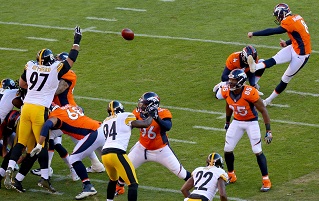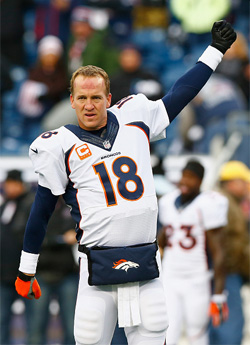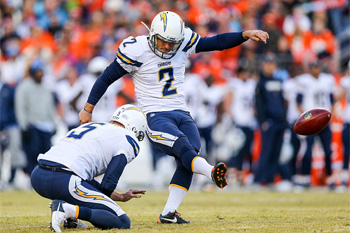6 WTF Things That Somehow Lead To Success In The NFL

To inform those who break out in hives whenever they come within a mile of televised sports, pro football is big business. NFL commissioner Roger Goodell has predicted that league revenues will reach $25 billion by the year 2027. Team owners are willing to drop a small fortune figuring out how to assemble a stable full of winners. But it's not just the people in the business who care about this. Every year, hordes of fantasy football geeks will spend countless hours trying to predict the NFL studs of the season, turning it into a $70 billion market. From wannabe Draft Kings insta-millionaires to those just looking for office bragging rights, everyone is vying for the secrets to success.
But predicting how an athlete will perform in the NFL is a crapshoot. Or is it? It turns out there are a few things that better a player's odds when it comes to success in the NFL.
Don't Get Drafted Early

The NFL draft is the most popular way to acquire fresh meat for the grinder (otherwise known as eligible college players). Teams make selections in reverse order according to how horribly they performed the previous season, so ideally, it's an opportunity for subpar organizations to shore up their roster so that they're able to spend the next year doing more winning and less "inspiring."
Maintaining the thoroughness of a forensic investigation, each team analyzes scouting reports, Combine performances, and Wonderlic scores in the hopes of determining the very best talent available. With seven draft rounds and each team selecting a player only once every 32 slots, it would make sense* that the best of the best will get snapped up in the first two rounds. Then, you know, go on to kill it in the NFL and make awkward cameos in comedy films.

*Sense not applicable to the New York (Jets), Cleveland, or Washington franchises.
But that's not how it always works. Thanks to backroom trade machinations and perhaps too much emphasis placed on the Wonderlic and Combine, the best players aren't always drafted first. A recent study analyzing offensive skill positions (quarterbacks, running backs, and wide receivers) found that running backs and wide receivers drafted later were actually a better choice than their picked-first counterparts. According to the research, 60 percent of running backs and wide receivers picked up in the third through seventh rounds amassed greater average career statistics than those snapped up in first and second rounds. If this all sounds like gibberish, it's kind of like how one of Magneto's first-round draft picks for his Brotherhood was Toad, who in 1964 had the powers of hopping and getting captured. He'd later draft Blob, who in 1964 had the power of "Literally none of your punches hurt me."
However, the same study found that quarterbacks selected early appeared to be better picks than their lower-level brethren. But we live in a world of terrifying chaos, as even then, they don't always get it right. For anecdotal evidence, consider the 199th sixth-round pick from the 2000 draft. With six quarterbacks picked up before him, conventional wisdom would say that this lowly draftee didn't have much of a shot. But he'd go on to become Football Moses, helping the Patriots to part oceans of Super Bowl contenders.

Be Super Hot (Especially If You're A Quarterback)

That million-dollar smile, a jawline carved of granite, and the body of a Greek god. In addition to passing and running plays, we expect our quarterbacks to appear as if they just got done lecturing their GQ cover photographer about maintaining perfectly-trimmed hair between crunches. And for the most part, they do.

But is there a link between superior athleticism and looking like the "Eureka!" moment of combining The Rock and Ryan Gosling's DNA? Unfortunately for all the average-looking Joes out there, the studly quarterback may be more than a tired cliche. Scientists in the UK have found a positive correlation between looks and athletic performance. Give us back our lunch money, science.
In the study, a group of women were shown images of quarterbacks, and were asked to rate them on an attractiveness scale from 1 to 10. The women participating in the study were European, so presumably they wouldn't know an Aaron Rodgers from a Ben Roethlisberger, and no "In New York he's a 4, but in Cleveland he's a 7" hometown bias would come into play. After comparing those "hot or not" numbers with the quarterback's on-field stats, a connection between pass completions and dreamboat status was established.

And that's not the only benefit of being a gridiron Adonis. According to a New York Times report, better-looking QBs make more bank than their less fetching counterparts. Using "symmetry of the face" as the benchmark for hotness, it was positively correlated with a quarterback's salary. Specifically, an increase of one standard deviation in facial symmetry led to a nearly 8 percent increase in pay. So seriously, try to be super hot. And if that fails, start banning math from schools. I think we would all feel pretty great right now if it wasn't for numbers.
Get Arrested (But Don't Get Charged)

From the mundane (marijuana possession), to the horrifically bizarre (kicking a lap dog to death in "self-defense"), certain NFL players can't seem to avoid tangling with the law. I'd add a "cough cough (insert player's name)" joke here, but honestly, I'm still pretty sad and pissed off about that dog thing.
Thanks to the fact that some media outlets seem hellbent on perpetuating the bad boy player narrative, it feels like an industry-wide epidemic. But you might be surprised to learn that NFL athletes on average actually have a lower arrest rate than the general population. Even so, an arrest spells disaster for a player, and teams would be wise to steer clear of these rotten apples, right? It's better to hire players who'd fly cross country just to get the chance to open a door for an old lady than their non-door-opening peers, right?
Actually, if you find just the right amount of trouble, it appears you'll succeed beyond your squeaky-clean, goody-two-shoes teammates. Economists analyzed five years of NFL draft data, grouping players according to the following: arrested but not charged, arrested and charged, suspended for another reason, and players with a "clean" record. The overall performance of players who had an arrest record but no charges was better than that of those without an arrest. In addition, those arrested and charged performed as well as those with clean records. So the lesson here, I guess, is be bad ... just, not bad enough to make it stick. I'm not saying that you should pee on another dude in public just to get ahead in your career, but maybe dribble a little bit on him. See what happens.
Play For A Team On The West Coast

Whether it's combing through obscure message boards looking for a tidbit of personal player information or checking and rechecking the Vegas line, fantasy football enthusiasts are notorious for agonizing over every little triviality before choosing their lineup each week. But what if there was something simpler to help guide them? Could something as ho-hum and obvious as time zones make a difference? As it turns out, being three hours behind Georgia is a great way to beat the visiting Georgia team.
After reviewing 40 years of pro football games between East and West Coast teams, sleep researchers from Stanford University and a bunch of other smarty-pants schools found that teams located in the Pacific Time Zone who were playing on their home turf have a distinct advantage over teams from the East. This is thanks to circadian rhythm -- something all humans, including athletes, are victims of.

"I tried to warn my team, but they wouldn't listen!"
Circadian rhythm is basically the 24-hour body clock which determines when you're at peak physical performance and when you should be laying low. For most people, late afternoon is when they're at the top of their game, and 3 a.m. is optimum time for hunkering down. The rest soon find out that there's no better time to be super energized than when you have to focus on not waking up everyone around you.
Researchers surmised that the closer an athlete is to his peak performance time, the better he'll play. And since they had chosen to tag-team with common sense, they were right. Crunching the data showed that during West Coast night games, players from the West will outperform their East Coast opponents by virtue of being nearer their peak. How huge is this advantage? The study found that West Coast teams beat the point spread two times as as often as East Coast teams. California, you may be thirsting to death, but biology is still on your side.
Be Born Rich And Privileged (If You Are A Kicker)

NFL Kickers -- the most reviled position on the team. At best, they're viewed as a necessary evil, slowing down the game at key moments ...

... and at worst, they're called out for not being football players at all.
As far as physique is concerned, they range from "decent" to "bring your fan to work day." So what's the secret to making it into the NFL? Apparently, kickers, punters, and long snappers can spring from so-so athletic stock and thrive. For the right price, that is.
Because it's such a specialized skill, with only a few coaches able to pass on this arcane knowledge, learning how to kick like the next Gostkowski is going to set you back some. Unfortunately for kids without money to burn, you can't learn the proper techniques from any old high school coach, and the kicker instructor market is able to demand top dollar to hand out this info. You have to find a wizard, or at least have deep pockets.
As one of these kicking gurus explained in The Atlantic, "It's not generic information, it's rich information that not everybody knows about; it's something you have to do for years." They speak about it like you just found them at the end of a cave, etching their wisdom into a tablet. You only go this deep into anything if you have the cash to pay for it, or you're trying to kill Bill.

And it's not just paying for specialized instruction. The money forked over also buys you the opportunity to network your way into coveted spots on elite teams. These private instructors work the other side of the fence, advising coaches and recruiters on which players should move on to the next level. This exclusive, incestuous relationship has led to a trickle-down effect in the NFL. As the same article goes on to point out that, "Though it's dangerous to conflate race with wealth, it's unmistakably obvious that kickers, as a group, are overwhelmingly white."
How lily white? While overall player composition was given an A+ for racially diversity by TIDES (The Institute for Diversity and Ethics in Sport) in 2016, 100 percent of the 36 NFL placekickers are white. And out of 32 punters, only one (Marquette King of the Oakland Raiders) is black.
Grow Up In A Tiny Western Pennsylvania Mill Town

If your parents didn't have the decency to be filthy, stinking rich (jerks!), the next-best thing for an aspiring pro player would be to grow up in an obscure, hardscrabble mill town. Aliquippa, Pennsylvania, to be exact. Like some kind of American dystopian training ground, this tiny town has a knack for churning out battle-ready NFL players. It produces outstanding athletes like Gotham City produces color-schemed terrorists.
With a population that's never cracked 30,000, Aliquippa has one of the best per capita records for producing professional-grade athletes in the country. And it's especially good at producing NFL players -- specifically first-round draft picks. Mike Ditka, Tony Dorsett, Ty Law, Sean Gilbert, Darrelle Revis, and Jonathan Baldwin are all from Aliquippa and former first-round draws, meaning that somewhere, a person just applied to try out for their college football team with a sheet of paper that says "Aliquippa" and nothing else. While there are plenty of hard-knock towns sprinkled throughout the U.S., this particular city appears to have the perfect alchemy of grit and reverence for the game. It's geographical sorcery, and you should be able to throw a perfect spiral just by being within the county.
Today, there are fewer than 10,000 residents and the poverty line hovers around 20 percent, but Aliquippa continues to crank out potential superstars. Kwantel Raines, Alquippa class of 2018, began receiving college offers before he made his first high school start. Raines, who is now a junior, currently has 15 colleges, including West Virginia and Pitt, vying for him. His friends, who may have never played football before in their lives, currently hover at only nine colleges.
So there you go. You know have all the information you need to become an NFL superstar like you've always dreamed. And after you get tired of that, you can use those skills to become a professional wrestler. You're welcome.

